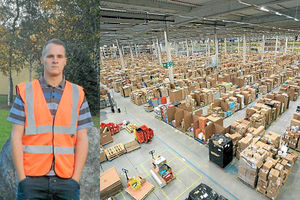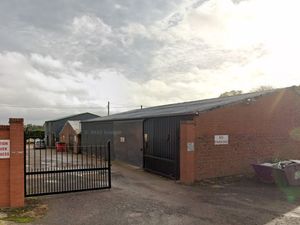Internet retail goliath Amazon treats staff like robots - TV review
It is the remarkable success story which shows no sign of slowing as internet shopping continues to grow and grow.

But just how does Amazon get all its parcels and presents out on time to its millions of customers? The BBC's Panorama programme decided to have a look at what goes on in those vast warehouses dotted across the country.
They sent in undercover reporter Adam Littler – with eye-opening results. The 23-year-old walked 11 miles during gruelling 10-and-a-half hour night shifts, and regularly clocked up six miles when he was working days.
And a whistleblower at Amazon's Rugeley base told the programme the warehouse was like a 'slave camp'.
The first shots of Adam, the man predominantly enlisted with exposing Amazon: the truth behind the click, showed an energetic sporty type out on the hillsides of Wales taking part in a cross country run. Should be a piece of cake collecting computer games, novels and children's toys shouldn't it?
Once inside the Swansea warehouse with his covert camera, Adam began recording footage. The first thing you notice is how vast the warehouse actually is. If you've seen the closing shots of the first Indiana Jones movie, where the Ark of the Covenant is packed in an unremarkable crate and deposited in a seemingly never ending aisle, then imagine that multiplied by 10 – and on four levels.
During the day shift, Adam films the monotonous task of item picking, with all eyes on the handheld scanner that helps to locate products, timing every move. He is fitted with a wristband which records his steps, and reveals his 11-mile night shift ordeal.
Exhausted, and with blistered feet, he recorded himself in the mirror: "I've never done a job like this. The pressure is unbelievable." To meet the target number of picks per hour, Adam believes a high percentage of running would be needed. Then our investigator turns up at work two minutes late and incurs half a penalty point.
Professor Michael Marmot, a university professor, and specialist in stress at work, reviewed the footage.
While it may be the managers handing out the points to those turning up late, ill or slow in their work, Marmot questions the organisation itself.
Paul Kelly, general secretary for the GMB trade union had this to say: "The level of pressure on people is incredible. I've never seen anything like it."
Many former employees were on hand to slate it too, with one commenting: "People are just working in line after line. They're like robots."
Needless to say, a short time into his Amazonian career and Adam – having picked up two points – decides enough is enough.
It is doubtful the show alone will derail the juggernaut – Amazon turned over 61 billion dollars worldwide last year.
But one or two might just think twice before clicking 'add to basket' after this gripping exposé
Amazon sent the following response to the Express & Star following publication of the above article:
We strongly refute the charge that Amazon exploits its employees in any way. The safety of our associates is our number one priority, and we adhere to all regulations and employment law.
We provide competitive wages and stock grants which over the past five years have added an average of 12% to base pay annually. This means that, on average, an Amazon associate with two years' service will be earning £8.98 per hour for a day shift or £10.78 per hour for a night shift. Additionally, we provide a raft of benefits. Further details can be found at www.amazon.co.uk/fcpractices.
Amazon has retained an independent expert who has visited our buildings and associates. In the independent expert's opinion, a picking role is similar to jobs in many other industries and does not increase the risk of mental and physical illness.
Amazon is proud to have a highly favourable safety rate compared to companies in the same industry. From April 2012 to October 2013, Amazon's RIDDOR rate (the "Reporting of Injuries, Diseases and Dangerous Occurrences Regulations" as defined by the UK Health and Safety Executive) was less than 40% of the average for companies reporting under the same industry code.
We understand that our progress depends on good execution and good judgment from thousands of employees. Together, we're working hard to make sure that we are better tomorrow than we are today.





